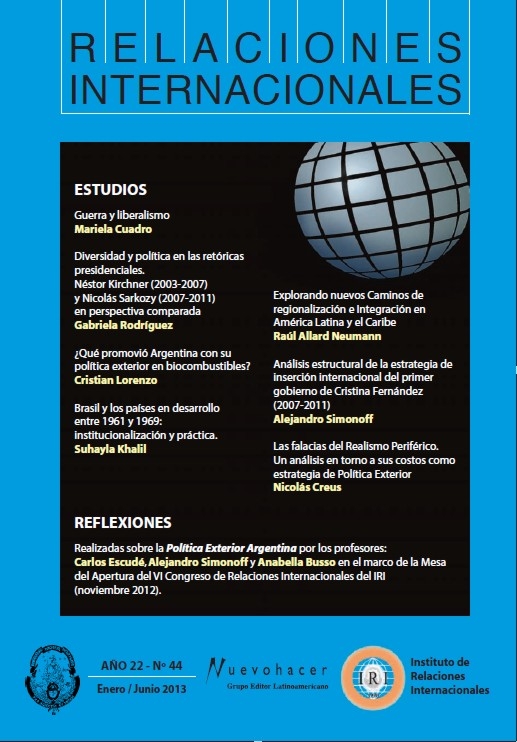Brasil y los países en desarrollo entre 1961 y 1969: institucionalización y práctica
Abstract
This work addresses the relations between Brazil and the developing countries in the first two post-1964 military governments. The problem that motivated the work is that although the foreign policy speech CastelloBranco government (1964-1967) was strongly linked to bipolarity, the alignment with the United States and the struggle against communism, the practice showed a closer relationship with the third world, their arrangements, advocates of a new division of the world, often seen as subversive. This practice remained in the Costa e Silva (1964-1967), under new tonic. We suggest that analysis of institutionalized ideas is fundamental to explain Brazil’s policy for the third world between the years 1964 and 1969.
Downloads
Downloads
Additional Files
Published
How to Cite
Issue
Section
License
Aquellos autores/as que tengan publicaciones con esta revista, aceptan los términos siguientes:
- Los autores/as conservarán sus derechos de autor y garantizarán a la revista el derecho de primera publicación de su obra. A partir de noviembre del 2020 los artículos se publicarán en la revista bajo una licencia Creative Commons Atribución- NoComercial-CompartirIgual 4.0 Internacional (CC BY-NC-SA 4.0). Acorde a estos términos, el material se puede compartir (copiar y redistribuir en cualquier medio o formato) y adaptar (remezclar, transformar y crear a partir del material otra obra), siempre que a) se cite la autoría y la fuente original de su publicación (revista y URL de la obra), b) no se use para fines comerciales y c) se mantengan los mismos términos de la licencia.
Previo a esta fecha los artículos se publicaron en la revista bajo una Licencia de reconocimiento de Creative Commons (BY-SA 2.5). - Los autores/as podrán adoptar otros acuerdos de licencia no exclusiva de distribución de la versión de la obra publicada (p. ej.: depositarla en un archivo telemático institucional o publicarla en un volumen monográfico) siempre que se indique la publicación inicial en esta revista.
- Se permite y recomienda a los autores/as difundir su obra a través de Internet (p. ej.: en archivos telemáticos institucionales o en su página web) antes y durante el proceso de envío, lo cual puede producir intercambios interesantes y aumentar las citas de la obra publicada. (Véase El efecto del acceso abierto).


























